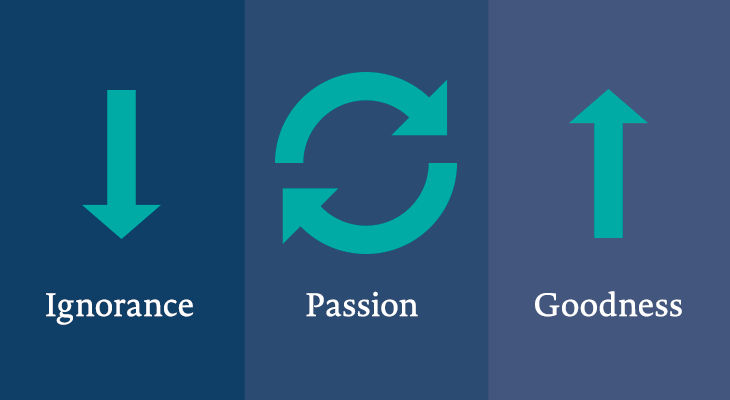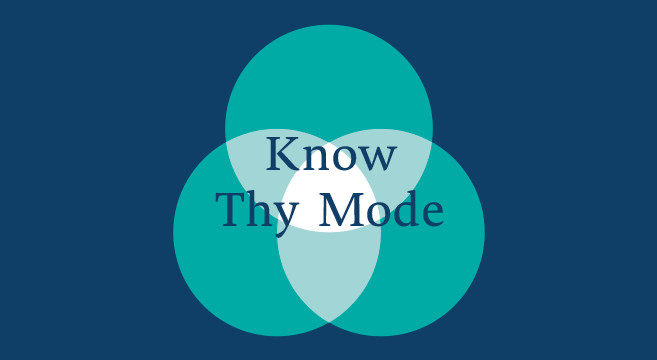Who are we – helpless victims of a cruel world or masters of our own destiny? Nitesh Gor gives us a clue in the second excerpt from his book ‘The Dharma of Capitalism – A Guide to Mindful Decision Making in the Business of Life’
[hr]
Like any skill, acting in the Mode of Goodness can become second nature, but it takes practice, discipline and the occasional short-term sacrifice.
Going on the premise that we act our way into thinking (as opposed to the other way around), to figure out which mode you’re in at any given moment it’s helpful to keep track of your actions and outcomes and be honest in identifying your real motivations.
In the following pages you will find some specific characteristics of each of the Three Modes in different areas of life and work. Once you’ve obtained a sense of the behaviour that tends to define each mode, take a few minutes at the end of each day to jot down some notes about decisions you’ve faced or made, evaluating them in the context of the Modes, for example:
[unordered_list style=”bullet”]
- What was my true motivation?
- What mode was I in?
- Did I consider all the consequences of my actions?
[/unordered_list]
In some situations you may be primarily in the Mode of Ignorance. In others you may be in Passion or Goodness. In still others the dominant mode may be unclear.Thinking about the difference will help develop a thought process for approaching future choices.
Do this for a few weeks, noting any changes in your behaviour. Give yourself permission to backslide and to be bewildered at times. If it was easy, you wouldn’t be reading this book.
| IGNORANCE | PASSION | GOODNESS | |
|---|---|---|---|
| WORLDVIEW IN THE MODES | • Interest limited to immediate sphere of existence • Disinterested in global or social issues • Defeatist, no value seen in striving for change • Bitter, negative, pessimistic | • Narcissistic • Self-perceived as special, unique, better than others • Living only for today | • Feeling connected to the world • Aware of a higher purpose • Aware of consequences • Tying personal benefit to benefit of others |
| STATE OF MIND IN THE MODES | • Disinterested in knowledge and growth • Lacking goals or desire to achieve • Life feeling out of balance • Confused, helpless, depressed, jaded, angry | • Highly motivated to succeed • Mentally agitated or anxious • Preoccupied with profit or advantage • Desires, emotions hard to control • Perplexed by moral dilemmas | • Mind is peaceful, calm • Sense of control over desires and thoughts • Detachment from base instincts of mind and body • Lacking personal agendas • Instinctively knowing the right thing to do |
| COMMUNICATION IN THE MODES | • Aggressive, argumentative, defensive, profane • Unconcerned for feelings of others • Critical, sarcastic, ridiculing • Cynical, suspicious | • Rash, impulsive • Interrupting, reactive • Self-involved, narcissistic • Manipulative | • Listening well • Curious, desiring to learn • Honest about motivations, feelings • Empathic • Inviting, non-confrontational • Avoiding and ignoring gossip |
| PERSONAL CHOICES IN THE MODES | • Seeking the easy way out • Avoiding choices • Disinterested in moral issues • Unconcerned about consequences or benefits • Unconcerned about violence or distress to others • Prone to laziness | • Motivated by prospect of reward or pleasure • Crave personal credit or recognition • Ignoring sound advice • Exploiting knowledge solely for personal gain or status | • Acting in a calm, regulated way • Motivated by responsibility • Desiring to serve a greater cause • Sacrificing short-term gain to do the right thing |
| CAREERS IN THE MODES | • Poorly managed work space • Workers treated disrespectfully • Motivated only by a salary • Disinterested in personal development • Disinterested in organization • Work performed mechanically • Avoiding responsibility | • Desiring personal accomplishment, wealth, power • Ambitious, determined, workaholic • Self-identifying as heroic or courageous • Money and status trump ethics and work quality | • Life-long learning • Motivated by betterment of self • Aspiring to provide quality products or services • Attracted to work that involves improving the lives of others |







